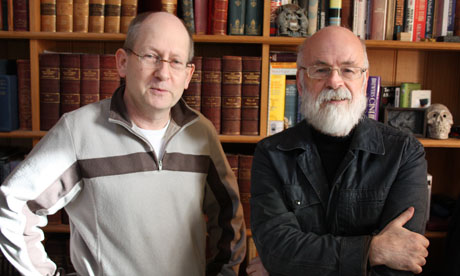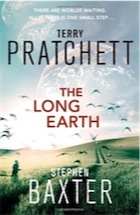
Baxter and Pratchett: a marriage made in fan heaven. Photograph by Rob Wilkins
You know the way books include a page listing previously published works by the author? In The Long Earth that list runs to five pages and includes 112 titles. Pratchett and Baxter are certainly no strangers to productivity, or popularity, and this, their first collaboration, is a marriage made in fan heaven – Pratchett's warmth and humanity allied to Baxter's extraordinarily fertile science-fictional imagination. The Long Earth is the first in a projected series that looks set to ratchet that 112 up a few notches.
 The central idea is a string of alternate earths, all within the same spacetime as our world but each occupying different quantum dimensions that are "the thickness of a thought away". Alt-earth is a hoary old standard of SF, of course, and usually writers shove-ha'penny their characters into these same-but-different worlds in order to explore historical counterfactuals – Hitler winning the second world war, and so on. But Pratchett and Baxter have a neat new spin on the notion: their enormous chain of parallel earths is entirely empty of humanity. It's a string of pristine Edens inhabited only by the Eocene fauna that were, on our world, hunted to extinction by early man. People "step" into these neighbouring dimensions via a gimcrack device: a box with a switch on top, powered (this seems to be important) by electricity generated by a potato. Because the "stepper" box is so easily made, millions of ordinary people are able simply to wink out of existence in this world and start a new life in any one of the unending series of invitingly empty, pastorally perfect earths.
The central idea is a string of alternate earths, all within the same spacetime as our world but each occupying different quantum dimensions that are "the thickness of a thought away". Alt-earth is a hoary old standard of SF, of course, and usually writers shove-ha'penny their characters into these same-but-different worlds in order to explore historical counterfactuals – Hitler winning the second world war, and so on. But Pratchett and Baxter have a neat new spin on the notion: their enormous chain of parallel earths is entirely empty of humanity. It's a string of pristine Edens inhabited only by the Eocene fauna that were, on our world, hunted to extinction by early man. People "step" into these neighbouring dimensions via a gimcrack device: a box with a switch on top, powered (this seems to be important) by electricity generated by a potato. Because the "stepper" box is so easily made, millions of ordinary people are able simply to wink out of existence in this world and start a new life in any one of the unending series of invitingly empty, pastorally perfect earths.
The Long Earth reads much more like a Baxter novel than a Pratchett one. It's not very funny, for one thing – discounting some wry dialogue and one not-very-successful stab at a comic character (a deceased Tibetan monk who has been reincarnated as a superintelligent drinks dispenser). Instead our hero, Joshua, explores stepwise for a million earths or so, the whole journey rendered with a characteristically Baxteresque mix of big-scale imagination and scientific rigour. The resulting novel is a surprisingly gentle piece of work. Something Wicked, or at least Something Worrying, is sweeping in from the further reaches of the long earth, driving frightened steppers before it like refugees; but it's a long time before we become aware of this, and not much is made of it. Otherwise human settlement upon the alternate earths is rural and low-tech (steppers cannot carry iron with them, for unexplained reasons) and almost entirely free of crime, rapine and nastiness. Lacking the pressures of overpopulation and with infinite natural resources to draw on, people just seem to get along with one another. Indeed, I'm tempted to call The Long Earth an exercise in utopian writing; an unfashionable mode nowadays, when grim-and-gritty dystopias rule the publishing roost. But I, for one, found it extremely refreshing.
The Long Earth is a short read: the pages riffle past and there's much to enjoy. The dialogue is a bit Hollywood 101, and much of it is characters explaining things to other characters, sometimes at great length ("Why are you telling me all this?" Joshua asks at one point, with apparent ingenuousness). But it's a charming, absorbing and somehow spacious piece of imagineering for all that.
• Adam Roberts's Jack Glass (Gollancz) will be published in July.
 The central idea is a string of alternate earths, all within the same spacetime as our world but each occupying different quantum dimensions that are "the thickness of a thought away". Alt-earth is a hoary old standard of SF, of course, and usually writers shove-ha'penny their characters into these same-but-different worlds in order to explore historical counterfactuals – Hitler winning the second world war, and so on. But Pratchett and Baxter have a neat new spin on the notion: their enormous chain of parallel earths is entirely empty of humanity. It's a string of pristine Edens inhabited only by the Eocene fauna that were, on our world, hunted to extinction by early man. People "step" into these neighbouring dimensions via a gimcrack device: a box with a switch on top, powered (this seems to be important) by electricity generated by a potato. Because the "stepper" box is so easily made, millions of ordinary people are able simply to wink out of existence in this world and start a new life in any one of the unending series of invitingly empty, pastorally perfect earths.
The central idea is a string of alternate earths, all within the same spacetime as our world but each occupying different quantum dimensions that are "the thickness of a thought away". Alt-earth is a hoary old standard of SF, of course, and usually writers shove-ha'penny their characters into these same-but-different worlds in order to explore historical counterfactuals – Hitler winning the second world war, and so on. But Pratchett and Baxter have a neat new spin on the notion: their enormous chain of parallel earths is entirely empty of humanity. It's a string of pristine Edens inhabited only by the Eocene fauna that were, on our world, hunted to extinction by early man. People "step" into these neighbouring dimensions via a gimcrack device: a box with a switch on top, powered (this seems to be important) by electricity generated by a potato. Because the "stepper" box is so easily made, millions of ordinary people are able simply to wink out of existence in this world and start a new life in any one of the unending series of invitingly empty, pastorally perfect earths.The Long Earth reads much more like a Baxter novel than a Pratchett one. It's not very funny, for one thing – discounting some wry dialogue and one not-very-successful stab at a comic character (a deceased Tibetan monk who has been reincarnated as a superintelligent drinks dispenser). Instead our hero, Joshua, explores stepwise for a million earths or so, the whole journey rendered with a characteristically Baxteresque mix of big-scale imagination and scientific rigour. The resulting novel is a surprisingly gentle piece of work. Something Wicked, or at least Something Worrying, is sweeping in from the further reaches of the long earth, driving frightened steppers before it like refugees; but it's a long time before we become aware of this, and not much is made of it. Otherwise human settlement upon the alternate earths is rural and low-tech (steppers cannot carry iron with them, for unexplained reasons) and almost entirely free of crime, rapine and nastiness. Lacking the pressures of overpopulation and with infinite natural resources to draw on, people just seem to get along with one another. Indeed, I'm tempted to call The Long Earth an exercise in utopian writing; an unfashionable mode nowadays, when grim-and-gritty dystopias rule the publishing roost. But I, for one, found it extremely refreshing.
The Long Earth is a short read: the pages riffle past and there's much to enjoy. The dialogue is a bit Hollywood 101, and much of it is characters explaining things to other characters, sometimes at great length ("Why are you telling me all this?" Joshua asks at one point, with apparent ingenuousness). But it's a charming, absorbing and somehow spacious piece of imagineering for all that.
• Adam Roberts's Jack Glass (Gollancz) will be published in July.

No comments:
Post a Comment